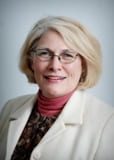 During the COVID-19 pandemic, the Loewenberg College of Nursing professors found ways to incorporate additional skills into instruction for students. With the importance of telehealth increasing, the pandemic created a unique opportunity to increase student knowledge in this area.
During the COVID-19 pandemic, the Loewenberg College of Nursing professors found ways to incorporate additional skills into instruction for students. With the importance of telehealth increasing, the pandemic created a unique opportunity to increase student knowledge in this area.
Janye Wilson, clinical assistant professor, added this function to her gerontology practicum course to help students with their patient interaction by phone. Using actors who participate in on-campus scenarios, patients called into class Zoom meetings. Students were assigned parts and as a group completed an interview assessment of each patient.
Students were able to ask general questions to get patient information. Using assessment tools, they learned in their didactic class, students asked questions to assess the specific area of need. They assessed a patient’s fall risk, caregiver strain, activities of daily living, anxiety and depression.
“The activity provided students with direct interaction with an older adult, allowed them to practice their interview skills, and helped prepare them for one of their competencies in which they will be interviewing an older adult individually. When we are at the clinical site, students get experience with these skills while caring for live patients, which is an important skill,” Wilson said.
To adhere to campus COVID-19 safety protocols, telehealth was also incorporated into the Master of Science in Nursing Family Nurse Practitioner (MSN-FNP) program. Twice a term, students participate in objective structured clinical examinations (OSCEs)—once during their mid-term and once at the end.
Usually an in-person activity, it was necessary to incorporate telehealth into the curriculum. The OSCEs are a multipurpose evaluative tool that uses actors to help assess competency in nursing students. The actors are given personas and scenarios to perform during a clinical examination. Because of safety protocols, it was necessary to move the evaluations online.
“We’ve been talking about teaching telehealth skills for a long time,” said Dr. Belinda Fleming, director of the MSN-FNP program. “We rewrote the OSCEs to be telehealth focused since there would be no in-person exam. We then trained the actors on the new patient scenarios and how to use Zoom.”
She said an added benefit to having the OSCEs online is that they can record the sessions via Zoom.
“We are able to provide important and valuable feedback to students to help them improve upon this skill,” Fleming said. “The videos can also be used to help educate and train future students.”




